The NBA tends to be a no excuses league, where athletes are expected to rise above any obstacles put in their way, regardless of the circumstances. This mentality has cost countless players a chance to reach their potential, playing against stacked decks and with heads filled with unrealistic expectations cast from a long history of having the basketball gods working in their favor.
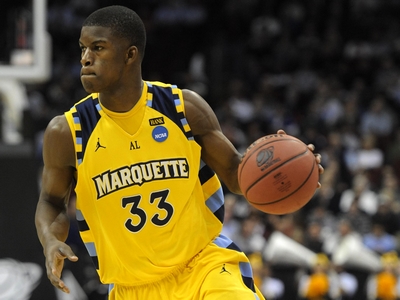
Chicago Bulls shooting guard Jimmy Butler could have been one of those exiled players, but he has shown a rare resiliency that is atypical of most people. From being rejected by his natural parents to being neglected by national recruiting services, Butler got used to hearing no much more frequently than your average star, in a sport surrounded by men who only hear yes.
Among over 900 former collegiate and international players in the Sports Aptitude database, only 26 have an Internal Motivation rating to match Butler's. This is the upper 97th percentile of basketball players in a measure that relates to self-discipline, goal-motivation, and the drive to exceed expectations.
Over the past nine seasons, 13 out of the 15 drafted players from this category are rotation players for playoff caliber teams, nine of these players are considered plus defenders, and three are trending towards max contract territory -- these guys find a way to get to the top.
Who will measure similarly in this year's draft class? We will soon find out. It shouldn't surprise anyone if they end up exceeding expectations significantly relative to their draft position.
Situation Factors: Individual Story & Anticipated Role
Butler wasn't heavily recruited out of high school, so he attended Tyler Junior College. As a freshman, he led the program to their first league title in over 20 years. His play caught the eye of Marquette, Kentucky, and Iowa State, among other Division I schools. Butler chose Marquette for academic reasons, and the relationship he would form with then head coach Buzz Williams would prove to be a catalyst for his bright future.
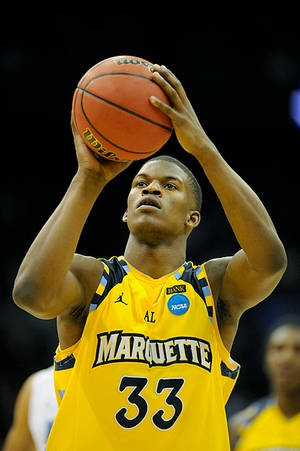
"I've never been harder on a player than I've been on Jimmy. I was ruthless on him because he didn't know how good he could be, Williams told ESPN in 2011. He'd been told his whole life he wasn't good enough. What I was seeing was a guy who could impact our team in so many ways.
What Williams may have also sensed was Butler's elevated Self-Assuredness and Objective-Mindedness. In the Sports Aptitude database, only four percent of players possess his rating combination. By definition, these scales measure insensitivity to criticism and an ability to act on facts and logic while avoiding sensitive feelings. Butler had an uncanny ability to take the hard truth and hear the message through the words, whereas other players would have folded, tuned-out, or transferred.
Butler played three seasons with the Golden Eagles, where he would take full advantage of his opportunities under Williams' guidance. While his development led to few college accolades, it did earn him an invite to the Portsmouth Invitational Tournament, where he won camp MVP and showcased every intricate skill he learned at Marquette. He epitomized what it meant to be a glue guy and his draft stock skyrocketed from potentially undrafted to a potential first-rounder.
The Chicago Bulls selected Butler with the 30th pick in the first-round, which seemed like a match made in heaven considering his core strengths as a player considering Tom Thibodeau's penchant for strong defense and the physical capacity to absorb large quantities of minutes.
However, Butler's path to playing time was still far from a clear picture. The Bulls were coming off of a trip to the Eastern Conference Finals in 2011 and were hungry for more offensive output, so Butler would have to bide his time before earning his meal ticket.
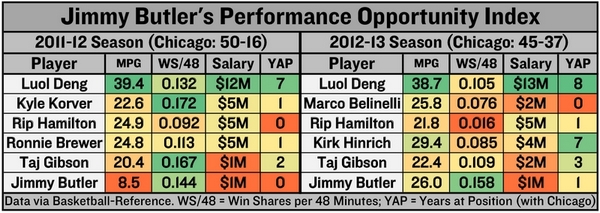
Chicago's rotating door of wing players was the perfect storm for Butler's personality and pursuit of his potential. He is in the Aggressive/Compulsive personality group, which Sports Aptitude defines as players who fight for control with a strong competitive edge and have an uncanny knack for thriving amidst chaos.
These players, on average, have substantially better impulse control and are far less likely to allow personal relationships to influence their actions. In the right environment, this is a perfect recipe for seizing opportunity when it presents itself.
Butler played reserve minutes to begin in his second NBA season, until Deng's injuries in early 2013 opened the door for him to carve out a permanent spot in the rotation. Still, it would've been easy for the Bulls to just pigeon hole Butler into the role of defensive-energy-guy and leave it at that.
But with Deng approaching free agency, Butler served as a potentially lower-cost alternative. After all, he had already proven himself capable of excelling within Thibodeau's defensive system as a reserve with his energy and intensity. Butler played exceptionally to close the season and would eventually become a full-time starter through the playoffs.
Situation Factors: Team Environment & Opportunity Given
Butler had survived the gauntlet and beaten out all contenders at the wing position to date, but his arrival as a starter was only half the battle. Though his grit and physicality made him a fan favorite and his versatile lockdown defense made him a coaches' darling, his future on the offensive end was murky.
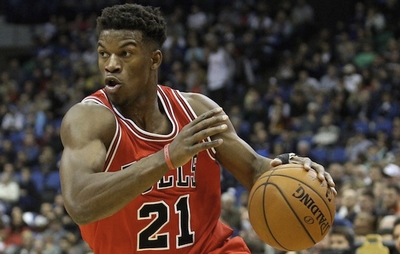
For a team starved for offense and facing an uncertain future with the oft-injured Derrick Rose, Butler's limited track history as a consistent perimeter shooting threat likely fed into their personnel decision-making process.
The Bulls used two first-round picks on perimeter players who projected as superior offensive options relative to what Butler had previously shown. The investment in Tony Snell in 2013 and Doug McDermott in 2014, coupled with the additions of Pau Gasol and Nikola Mirotic, suggests that the team was actively planning on bolstering its floor spacing and perimeter scoring.
This may also have played into the discrepancy between Chicago's initial contract offer and what Butler and his representatives were seeking in an extension. Butler's team at Relativity Sports, led by experienced agents Happy Walters and Steve McCaskill, knew the market would be far more favorable based on his existing skill-set and the upcoming salary cap spike (Butler is now considered a cinch to receive a max contract offer this summer), but taking his game to the next level would require a change in routine.
Despite his status as one of the premier defenders in the NBA, Butler is classified in the Sports Aptitude database as being a member of the Bold/Combative group, which is filled with green light ballers that have little conscience and are quick on the trigger. This personality characteristic clearly paid dividends when it came to competing on the court for the Bulls.
However, this category includes players that are often slow to trust and prefer to stick to their own routines. They can also have a stubborn streak and extreme level of skepticism of others, which can make them resistant to change.
The successful relationship Butler built with his agency likely helped him overcome any reservations about opening his mind and working all summer with a skills-based trainer that would focus on his shooting and ball handling. Butler doubled-down on his own belief in his skills, relinquished some control, and went to work on adding new dimensions to his game.
Working smarter and harder would lead to the largest step in his career, which was an unexpected development for everyone involved. Despite the new additions, Thibodeau had faith in Butler and put the ball in his hands more than ever by piping him all the minutes he could handle. This decision would pay off right off the bat, as Butler immediately showed significant progression as a go-to guy, which is detailed by his progression in major Synergy Sports Technology stats categories.
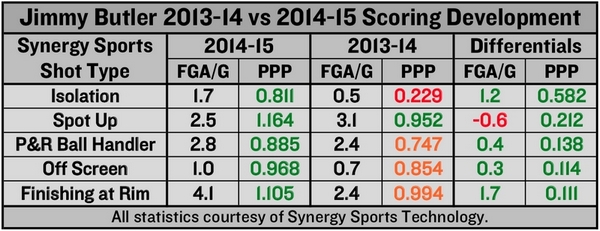
Butler provided the raw tools with his exceptional personality profile, the proof of which he displayed time and again throughout the situations he found himself in. When obstacles were set before him, he had the chops to take the heat and battle through adversity. When the stars aligned and provided a window of opportunity, he struck with lethal aggression. And when it was time for a change of strategy, he had the level-headedness to see the bigger picture and focus on his top priority.
In social science, the fundamental attribution error is a way of stating that humans have an uncanny tendency to give too much credit to an individual for their success or failure, while completely discounting the contributing circumstances. In basketball, people pay lip service to the value of a system for a player's performance, but when there is no floor spacing and a team's star player is forcing drives to make something happen, he still gets yelled at for his poor decision-making when he turns the ball over.
Butler is a testament to this truism. Though he was better equipped than most to succeed, his four-year journey to NBA stardom was littered with circumstances that were never predicted or prearranged to lead to this point. Taking the fundamental attribution error to heart, it is clear that one of the biggest market inefficiencies in the NBA is our lack of ability to account for the impact that situation has on the success or failure of a player.
There is no magic formula for predicting the type of rise to prominence that Butler has experienced, but using a combination of categorical personality profiling, performance analytics, and observational scouting can help us to better identify the key circumstances that help to maximize success. A more systematic approach to studying players based on their common characteristics and the similar circumstances they share is critical for understanding the science behind player development and, hopefully, clearing the way for the next Jimmy Butler to thrive.

















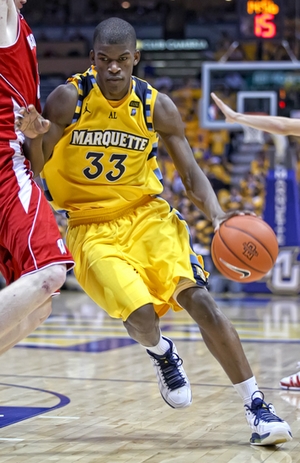








Comments